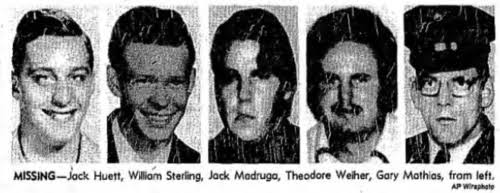The Yuba County Five

The Strange Disappearance Of The Yuba County Five
On the night of the 24th of February, 1978, a group of five youthful men – who were all a part of a program for the mentally handicapped – attended a college basketball match at California State University, Chico. They were: Jack Madruga, 30, William Sterling, 29, Ted Weiher, 32, Gary Mathias, 25, and Jack Huett, 24, all from the Marysville region in California.
The group of men had been foreseeing their Special Olympic basketball competition that was planned for the very following night in Sacramento. They schemed on attending the college basketball match to get them excited for their own game. Before they evacuated, they neatly laid out their basketball jerseys on their beds. If they won their competition, they earned an outing to Disneyland in California.
Nonetheless, the five playmates would never make it to their game.
Attending the college basketball game in Chico, the men aimed at driving back home. They all clambered into Madruga’s Mercury coupe and drove to an amenity store in downtown Chico to buy snacks and drinks for the drive back. This was at nearly 10 PM. After leaving the shop, the men faded away. Various days later, their vacant car was discovered some 70 miles away on a Plumas National Forest road. It seemed as though the men unaccountably turned off a highway on the way home, driving east instead than south.
An examination of the car implied no indications of foul play and disclosed it was in working order, ruling out the car breaking down. “The car was littered with candy wrappers, basketball strategies, milk cartons, and other element implying a good time,” said a Butte County sheriff.
The height of the site where the Mercury coup was discovered was 4,400 feet and the region was encircled by deep snow. It wasn’t looking favourable. The lost men were wearing only pale clothes and the area was extremely thick and mountainous. “Some places you can only get in on horseback,” said Yuba County Undersheriff, Jack Beecham. While the men did endure from mental disabilities, they all could work very well. Nonetheless, their families said that their behaviour inclined to “deteriorate” if put in an aggravating situation.
However, it was totally out of nature for them to just up and disappear on their own accord, especially given the truth they were all so eager about their upcoming basketball game. “Ted wouldn’t have missed that game for anything,” said his mother.
According to their families, they most certainly wouldn’t have driven up a separated, uncommon road in the middle of the night and just evacuated their car for no motive. “I’m pretty sure he would have come home directly from the game,” said Madruga’s mother. “There’s no way he would have gone freely into the cliffs at night.” Various of the men were extremely scared of the dark and two – Stirling and Wieher – disliked the cold climate and the outdoors.
Foul play was doubted very early on in the investigation: “They could have stopped to help somebody, and the people they supported took benefit of them,” suggested Sheriff Jim Grant.
Adding more to the dilemma, a spectator came ahead to notify police that he had seen the Mercury coupe at some point between 11 PM and midnight on the 24th of February. The spectator, Joseph Schons, had gotten his car stuck in the snow while riding on the same Plumas National Forest road where the vacant car would later be discovered. While the effort to shove his car out of the snow, Schons endured a cardiac arrest.
While waiting for help, Schons told two headlights occurred behind him and then halted around twenty feet behind him. He told that a group of men then clambered out of a Mercury coup and clambered into the next car and drove off. Nonetheless, Schons later told he couldn’t verify without a suspicion that there had been another car: “I was half-conscious, not lucid, hallucinating and in intense pain,” he later said. He did confirm, nonetheless, that he had noticed a Mercury coupe.
Quickly afterwards, another observer came ahead to say she had glimpsed the five men in a red, 1950s pickup truck at around 2 PM on the 25th of February. She alleged she saw the men outside a shop in Brownsville, nearly an hour away from where the Mercury coupe was discovered evacuated.
After the vacant car was discovered, a serious blizzard covered the region, impeding search actions and wrapping probable tracks. However, committees of deputies from Yuba and abutting Buttle counties surveyed the cliff on foot, on horseback, with dogs, in four-wheel-drive autos and a helicopter.
The preliminary search was all-out but various weeks later, the ground examination for the men was cancelled. The Yuba County sheriff’s office told they wouldn’t start again the ground examination unless new indication came forward that implied that the five men were still in the dense woodland.
While the ground examination was cancelled, a California Highway Patrol helicopter proceeded to ransack the area from the sky. “We’ve surveyed every place possible,” said Yuba County Sheriff Jim Grant.4
The case went cold until four months later when the melting of the cliff snow disclosed an awful fate when a group of motorcyclists went to a trailer conserved by the Forest Service around 19 miles from where the Mercury coupe was discovered. They saw the window was shoved and inward, they discovered the decomposed body of Weiher; his feet had serious gangrene after enduring from frostbite. They also discovered food, clothing, books, matches and fuel, all of which stayed untouched.
There was sufficient food to provide the five men for over a year. It was inferred that Weiher had stayed alive for up to two months in the trailer before perishing of hunger and hypothermia. The late spring thaw then uncovered the bodies of Madruga and Sterling around 11 miles from the vacant Mercury coupe. Both perished of hypothermia. Operatives theorised that one may have perished to the desire to nap that signifies the last stage of hypothermia and the other declined to leave his side.
Quickly afterwards, Huett‘s father – who had participated on the search – found his remains two miles from the trailer. Investigators think that Huett had been in the trailer with Weiher when he perished and after becoming stunned and frightened, fled from the trailer to get away from the body. Despite an all-out search, Mathias was never discovered.
The finding of the bodies directed to even more questions. Why would they wander more than a dozen miles uphill through thick snow rather of walking downhill or staying in their car? And even more tragically, why would at least one of them – Weiher – live for more than two months in a woodland service trailer yet ignore the food, clothing and fuel around him before eventually perishing? Their families stick to their assumption that somebody compelled the men up that cliff road and eventually, to their deaths.

 My First News Item
My First News Item My Nine News Item
My Nine News Item
